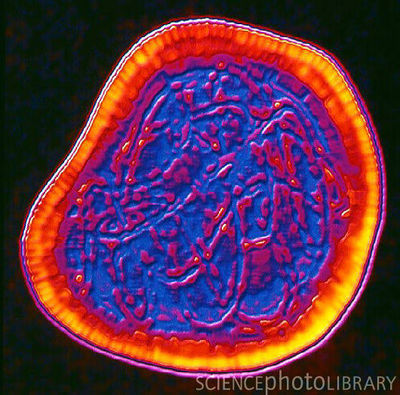Rubivirus: Difference between revisions
No edit summary |
|||
| Line 40: | Line 40: | ||
==Clinical Features== | ==Clinical Features== | ||
===Postnatal Infection=== | ===Postnatal Infection=== | ||
The rubella virus, when contracted postnatal, has very mild signs and symptoms. The disease begins with a rash that starts on the face, in most cases, and spreads to the rest of the body. In children, the disease will only cause the rash but in adults the rubivirus can cause mild fever, throat pain, arthralgia and enlarged lymph nodes, in addition to the rash. (3) The rubella virus causes a specific type of rash called maculopapular, meaning small flat, red and raised spots. (4) The main concern in regards to the rubella virus when contracted postnatal is for women who may become pregnant. The virus will spread to the baby, which will then cause major birth defects and could even cause death. | |||
===Congenital Syndrome=== | ===Congenital Syndrome=== | ||
==Diagnosis== | ==Diagnosis== | ||
Revision as of 12:08, 24 July 2014

Etiology/Bacteriology
Taxonomy
| Domain = Viruses | Class = ssRNA viruses | Order = ssRNA positive-strand viruses, no DNA stage | Family = Togaviridae | Genus = Rubivirus
Description
Pathogenesis
Transmission
Rubella virus is transmitted through direct contact with respiratory fluid. (2) The virus initially infects the respiratory tract and begins the replication process in that location. (3)
Infectious dose, Incubation, and Colonization
Epidemiology
Virulence Factors
Clinical Features
Postnatal Infection
The rubella virus, when contracted postnatal, has very mild signs and symptoms. The disease begins with a rash that starts on the face, in most cases, and spreads to the rest of the body. In children, the disease will only cause the rash but in adults the rubivirus can cause mild fever, throat pain, arthralgia and enlarged lymph nodes, in addition to the rash. (3) The rubella virus causes a specific type of rash called maculopapular, meaning small flat, red and raised spots. (4) The main concern in regards to the rubella virus when contracted postnatal is for women who may become pregnant. The virus will spread to the baby, which will then cause major birth defects and could even cause death.
![University of Oklahoma Study Abroad Microbiology in Arezzo, Italy[1]](/images/7/7c/OULOGOBIANCO.JPEG)
